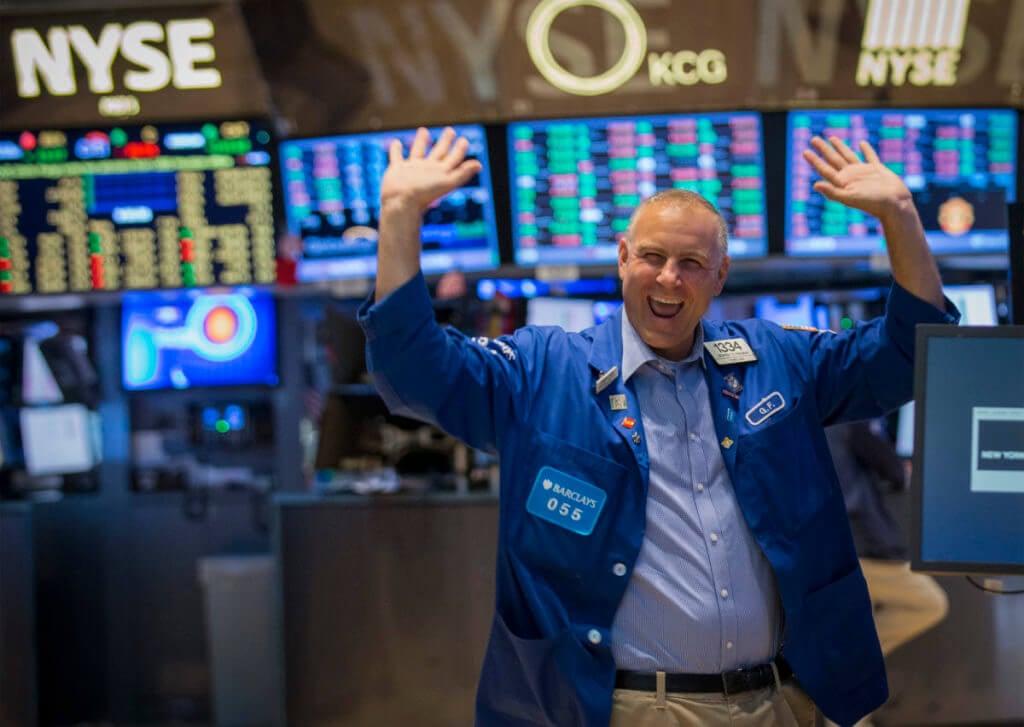Dow Surges After Blowout Jobs Data Distract from Sluggish Economy

The Dow surged on Friday after blowout jobs data dovetailed with new Chinese tariff waivers to distract from a sluggish US economy. | Source: REUTERS/Brendan McDermid
- The Dow rose on Friday thanks to blockbuster jobs growth but will likely close the week in the red.
- China announced it would wave trade war tariffs on US soybeans and pork.
- The move presents Trump with a dilemma as a new trade deal deadline approaches without a firm agreement.
The Dow accelerated its previously-cautious recovery on Friday, but the US stock market is on track to close the first week of December in the red.
Tariff concessions from China provided the spark, while a fantastic November jobs report added fuel to the fire.
Dow Accelerates Recovery
The Dow Jones Industrial Average may still record a weekly loss, but today’s 0.86% surge erased the bulk of the index’s early-week plunge. The Dow last traded at 27,914.58 for a session gain of 236.79 points.

The S&P 500 jumped 0.8% to 3,142.37, while the Nasdaq raced 0.82% higher to 8,642.46.
The gold price plunged more than 1%, as investors found little reason to hide in risk-off assets.
Blowout Jobs Report Sends Stock Market Into Overdrive
The Dow and its peers shot higher this morning after the November jobs report exceeded Wall Street’s wildest expectations.
Traders anticipated strong data, largely because the end of the GM strike promised to inflate the statistics a bit. Economists expected nonfarm payrolls growth of 187,000 , but the economy delivered 266,000 new jobs – the highest total since January.

The unemployment rate unexpectedly declined to 3.5%, matching its best reading of 2019 – which is also the best reading since 1969.
Commenting on the blowout jobs report, ING Chief International Economist James Knightley urged Dow bulls to temper their expectations. ING has already predicted that US GDP growth will lag the consensus forecast, and he warns that this will soon be reflected in weakening payroll gains.
He writes,
Despite today’s blowout number, the US economy is experiencing a slowdown and we expect this to be reflected in weaker payrolls gains in coming months. The weak global growth environment… has prompted a more cautious attitude from US business and already resulted in two consecutive quarters of falling capital expenditure.
China Delivers Trump a Key Trade War Concession…
The jobs report launched the recovery into overdrive, but stocks initially rose because China’s finance ministry revealed that it would waive retaliatory tariffs on US soybean and pork imports.
Those tariffs had been designed to inflict maximum pressure on President Donald Trump by targeting one of his key voting blocs, farmers.
These agricultural tariff waivers deliver Trump a coveted concession (while also serving Beijing’s interest ), but they also paint him into a corner . Less than two weeks before new tariffs kick in on Dec .15, it appears unlikely that the US and China will strike a trade deal before the deadline. Those tariffs would target $156 billion worth of consumer goods, including big-ticket electronics like smartphones.
That Also Backs the White House into a Corner
The White House believes tariffs give the US leverage over China, and the administration has displayed a reluctance to abort next Sunday’s hikes. Caving now would also diminish the credibility of Trump’s trade war threats (assuming there’s any credibility left).
With China’s newly-announced agricultural waivers, holding the line on tariffs became a bit riskier for Trump. In addition to the pain they could inflict on the stock market, they could also spur Beijing to revoke those tariff waivers before they had even been implemented.
Even worse for a Dow Jones that has already priced in a trade deal, Beijing may interpret it as a bad-faith gesture and storm away from the negotiations as the trade war prepares to enter a third calendar year.
“Most people around President Trump are telling him that’s a big risk,” Stephen Myrow, managing partner at Beacon Policy Advisors and a former Treasury official, told CNBC. “Throwing everything on right now would be a pretty big political miscalculation.”
On the other hand, maybe China’s decision to waive tariffs on some US farm goods is an indication that Trump isn’t bluffing when he says that trade talks are “going very well.”
And if the White House does delay the Dec. 15 tariffs, Dow Jones bulls may take that as a sign that a phase one trade deal is in the forecast after all.